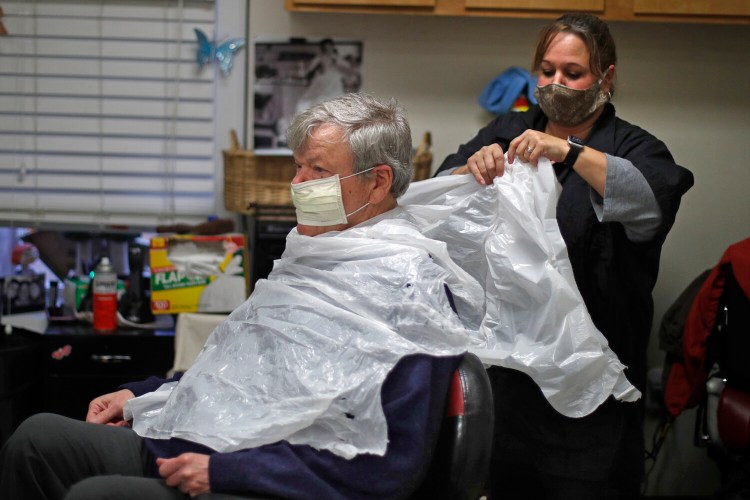The Maine Center for Disease Control and Prevention on Sunday reported 28 additional cases of COVID-19, the disease caused by the novel coronavirus, raising the total slightly as the state moves toward a quicker economic reopening.
The report, which noted no additional deaths, brings Maine’s totals to 64 deaths and 1,436 cases over the course of the pandemic. The total case figure includes 1,312 confirmed cases and 124 probable cases among people who have symptoms and have either tested positive on an antibody test or had close contact with a known case.
Subtracting people who have recovered – 861 – or died, there were 511 active cases as of Sunday.
The small rise in cases comes as Maine accelerates its schedule for reopening in several rural counties and dramatically expands its testing capabilities to match.
Last week, Gov. Janet Mills announced that certain categories of businesses may reopen with safety precautions in 12 counties where transmission has been slower: Aroostook, Piscataquis, Washington, Hancock, Somerset, Franklin, Oxford, Kennebec, Waldo, Knox, Lincoln and Sagadahoc.
Later this month, on May 18, restaurants and some campsites in those counties may reopen to in-person patrons as long as they follow safety measures.
Mills also said that the state was partnering with Westbrook-based Idexx Laboratories, a veterinary device manufacturer, to roughly triple Maine’s testing capacity. The move may help speed reopening, allowing health officials to more quickly identify and isolate new cases of COVID-19.
Still, Mills faces considerable pushback from business and religious leaders who believe her pandemic-era restrictions on public gathering and in-person patronage are heavy-handed.
Last week, an Orrington church filed suit against Mills, arguing that an executive order barring in-person services was unconstitutional.
On Saturday, U.S. District Judge Nancy Torreson denied Calvary Chapel’s motion for a temporary injunction against the ban on services, saying the state had used scientific evidence to make careful decisions in the interest of public health.
The judge’s decision does not end the lawsuit, which the church could still choose to pursue. But Torreson said she made her ruling partly because she believed Calvary Chapel was unlikely to succeed at trial, based on the arguments and evidence the church has presented.
The church has already appealed the decision, and its pastor said he would still hold services outside on Sunday.
That wasn’t the only legal filing to land on Mills’ desk last week. On Friday, nine Maine businesses sued the governor, seeking a quicker end to the shutdown, which they say has disproportionately hurt small businesses.
Maine Attorney General Aaron Frey says the executive orders behind the shutdown were “carefully crafted” to protect public health, and he promised to “vigorously defend” the plan.
Sunday was also Mother’s Day, and the Maine CDC’s director, Dr. Nirav Shah, who has been posting statistical updates and words of encouragement daily on Twitter, reminded Mainers to take a moment to thank their mothers.
“Our moms are, in every respect, the most essential workers of all,” he said.
Our moms are, in every respect, the most essential workers of all.
— Nirav D. Shah (@nirav_uscdc) May 10, 2020
On Sunday, 36 people were hospitalized with COVID-19 across the state, with 17 in critical care and 10 on ventilators. There were 158 intensive care unit beds available of a total 288, and 216 ventilators available of a total 308. Maine also had 413 alternative ventilators approved by the U.S. Food and Drug Administration.
County by county, there were a cumulative 84 cases in Androscoggin, six in Aroostook, 702 in Cumberland, 31 in Franklin, 10 in Hancock, 109 in Kennebec, 18 in Knox, 15 in Lincoln, 17 in Oxford, 90 in Penobscot, one in Piscataquis, 21 in Sagadahoc, 17 in Somerset, 49 in Waldo, two in Washington and 261 in York.
Health officials have cautioned, however, that limited testing has made it difficult to make an accurate count of the true number of cases, which is likely higher.
By age as of Sunday, only 2.8 percent of Mainers with the coronavirus were under 20, while 10.9 percent were in their 20s, 11.4 percent were in their 30s, 15.3 percent were in their 40s, 19.6 percent were in their 50s, 16.2 percent were in their 60s, 12.1 percent were in their 70s, and 11.7 percent were 80 or older.
By race, two people were listed as “American Indian or Alaskan Native,” 20 were “Asian or Pacific Islanders,” 73 were “Black or African American,” 829 were white, two were of two or more races, 26 were listed as “other,” and another 302 did not disclose their race.
By ethnicity, 32 were listed as “Hispanic,” 781 as “not Hispanic,” and another 441 did not disclose that information to health officials.
Women made up 53.4 percent of cases, with three cases listed as “unknown” gender and men taking up the rest.
Around the world on Sunday, there were over 4.1 million confirmed cases of COVID-19 and 281,000 deaths. The United States had 1.3 million cases and 80,000 deaths, the most of any country.
Copy the Story LinkSend questions/comments to the editors.




Success. Please wait for the page to reload. If the page does not reload within 5 seconds, please refresh the page.
Enter your email and password to access comments.
Hi, to comment on stories you must . This profile is in addition to your subscription and website login.
Already have a commenting profile? .
Invalid username/password.
Please check your email to confirm and complete your registration.
Only subscribers are eligible to post comments. Please subscribe or login first for digital access. Here’s why.
Use the form below to reset your password. When you've submitted your account email, we will send an email with a reset code.